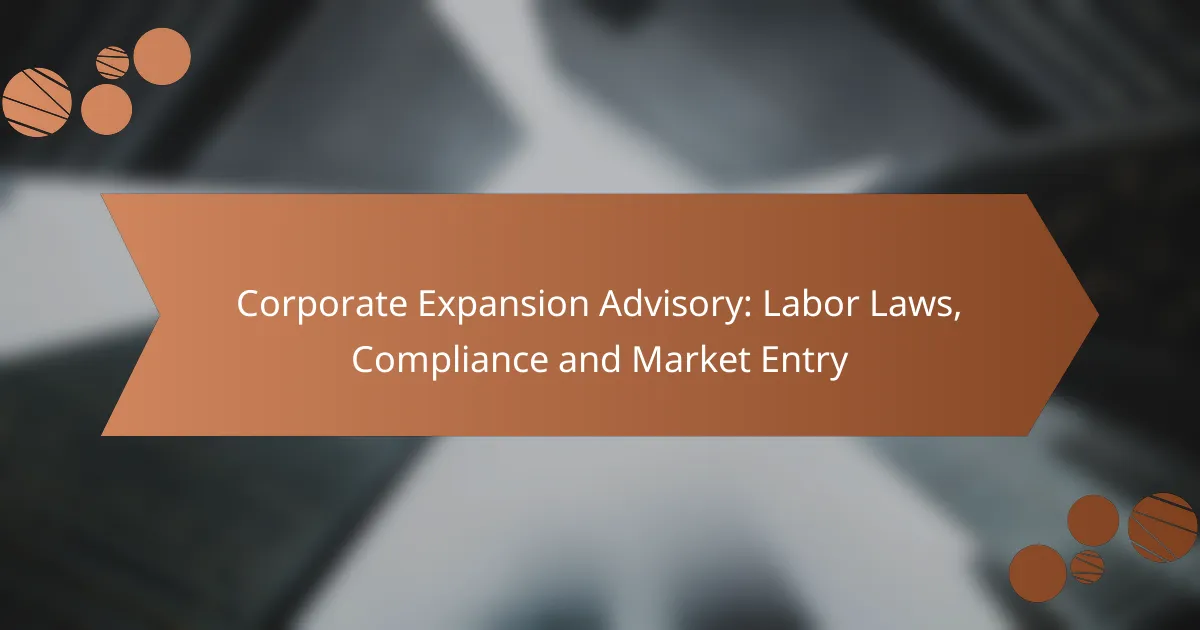Expanding a business in the US necessitates a deep understanding of labor laws to ensure compliance and operational success. This involves navigating employee rights, workplace safety, and fair labor practices, which are crucial for effective workforce management. Additionally, thorough preparation and strategic planning are essential for market entry, including comprehensive market research and establishing local partnerships to facilitate smooth operations and compliance.

What are the key labor laws for corporate expansion in the US?
When expanding a business in the US, understanding key labor laws is essential for compliance and operational success. These laws govern employee rights, workplace safety, and fair labor practices, impacting how companies manage their workforce.
Fair Labor Standards Act
The Fair Labor Standards Act (FLSA) establishes minimum wage, overtime pay, and youth employment standards. Businesses must pay at least the federal minimum wage, which is subject to change, and provide overtime compensation for hours worked over 40 in a workweek.
Employers should regularly review their payroll practices to ensure compliance with FLSA regulations. Misclassification of employees as exempt can lead to significant penalties, so it’s crucial to understand the criteria for exemption.
Occupational Safety and Health Act
The Occupational Safety and Health Act (OSHA) mandates safe working conditions for employees. Employers are required to comply with safety standards and provide a workplace free from recognized hazards.
Regular safety training and risk assessments are vital for compliance. Companies should document safety protocols and maintain records of any incidents to demonstrate adherence to OSHA regulations.
Family and Medical Leave Act
The Family and Medical Leave Act (FMLA) allows eligible employees to take unpaid leave for specific family and medical reasons while maintaining job protection. Employees can take up to 12 weeks of leave in a 12-month period for situations such as the birth of a child or serious health conditions.
Employers should have clear policies regarding FMLA leave and ensure that employees are aware of their rights. Proper documentation and communication are key to managing leave requests effectively.
Equal Employment Opportunity Laws
Equal Employment Opportunity (EEO) laws prohibit discrimination based on race, color, religion, sex, national origin, age, disability, or genetic information. Companies must ensure that their hiring, promotion, and termination processes are free from bias.
Implementing diversity training and clear anti-discrimination policies can help foster an inclusive workplace. Regular audits of hiring practices can identify potential biases and areas for improvement.
State-Specific Labor Regulations
In addition to federal laws, each state has its own labor regulations that may impose additional requirements. These can include minimum wage laws, paid sick leave, and specific workplace safety standards.
Businesses should research the labor laws applicable in each state where they operate. Consulting with legal experts can help ensure compliance and avoid costly fines associated with violations of state-specific regulations.

How to ensure compliance during market entry?
Ensuring compliance during market entry involves understanding local labor laws, regulations, and industry standards. This process requires thorough preparation and ongoing management to avoid legal pitfalls and ensure smooth operations.
Conduct a Compliance Audit
A compliance audit is a systematic review of your business practices against local laws and regulations. This audit helps identify gaps in compliance and areas that require immediate attention before entering a new market.
Key steps include reviewing employment contracts, workplace safety regulations, and wage laws. For example, in the European Union, businesses must adhere to directives regarding employee rights, which can vary significantly from one member state to another.
Engage Local Legal Experts
Hiring local legal experts is crucial for navigating the complexities of labor laws in a new market. These professionals can provide insights into specific regulations, cultural nuances, and compliance strategies tailored to your business needs.
Consider establishing a relationship with a law firm that specializes in labor law and has experience in your industry. This can help you avoid costly mistakes and ensure that your operations align with local expectations.
Implement Training Programs
Training programs for your employees on compliance issues are essential for maintaining adherence to local laws. These programs should cover topics such as workplace rights, anti-discrimination policies, and safety regulations.
Regular training sessions can help foster a culture of compliance within your organization. Aim for at least annual refresher courses and consider using local case studies to make the training relevant and engaging for your staff.

What are the best practices for navigating market entry?
Navigating market entry requires thorough preparation and strategic planning. Key practices include conducting comprehensive market research, establishing local partnerships, and understanding cultural differences to ensure compliance and successful integration.
Market Research and Analysis
Effective market research is essential for understanding the competitive landscape and consumer behavior in the target market. This involves analyzing market size, growth potential, and key players. Utilize both primary research, such as surveys and interviews, and secondary research from industry reports and government publications.
Consider employing tools like SWOT analysis to evaluate strengths, weaknesses, opportunities, and threats. This structured approach helps identify potential challenges and advantages, guiding your market entry strategy.
Building Local Partnerships
Forming partnerships with local businesses can facilitate smoother market entry. These partnerships can provide valuable insights into local regulations, consumer preferences, and distribution channels. Look for companies that complement your offerings and share similar values.
Establishing joint ventures or strategic alliances can also mitigate risks and enhance credibility. Ensure that any partnership agreements are clear and compliant with local laws to avoid future disputes.
Understanding Cultural Differences
Cultural awareness is crucial for successful market entry. Different regions may have unique consumer behaviors, communication styles, and business practices. Conduct cultural assessments to identify these differences and adapt your marketing strategies accordingly.
For instance, consider language nuances, negotiation styles, and social norms that may influence business interactions. Training your team on cultural competencies can enhance relationships and improve overall effectiveness in the new market.

What are the risks of non-compliance in corporate expansion?
Non-compliance in corporate expansion can lead to significant legal, financial, and operational repercussions. Companies may face penalties, damage to their reputation, and disruptions to their business operations, all of which can hinder growth and profitability.
Legal Penalties
Legal penalties for non-compliance can vary widely depending on the jurisdiction and the severity of the violation. Companies may incur fines that range from thousands to millions of dollars, depending on the specific labor laws or regulations violated.
In some cases, non-compliance can lead to litigation, which not only incurs legal fees but can also result in costly settlements or judgments. It’s crucial to stay informed about local labor laws and regulations to avoid these penalties.
Reputation Damage
Reputation damage can be one of the most detrimental effects of non-compliance. A company found to be violating labor laws may face public backlash, leading to a loss of customer trust and loyalty.
Negative media coverage can further exacerbate this issue, affecting relationships with stakeholders and potential partners. Maintaining compliance is essential for preserving a positive brand image and ensuring long-term success in new markets.
Operational Disruptions
Non-compliance can lead to operational disruptions, including forced shutdowns or halts in business activities while legal issues are resolved. This can result in lost revenue and increased operational costs.
Additionally, companies may need to divert resources to address compliance issues, detracting from core business activities. Implementing robust compliance programs can help mitigate these risks and ensure smooth operations during expansion.

How to evaluate the effectiveness of compliance strategies?
To evaluate the effectiveness of compliance strategies, organizations should assess how well these strategies meet legal requirements and internal policies. This involves analyzing performance metrics, conducting regular reviews, and gathering feedback to identify areas for improvement.
Key Performance Indicators
Key Performance Indicators (KPIs) are essential for measuring the success of compliance strategies. Common KPIs include the number of compliance violations, the time taken to resolve issues, and employee training completion rates. Establishing benchmarks for these indicators can help organizations track progress over time.
For example, a company might aim for a compliance violation rate of less than 5% annually. Regularly monitoring these KPIs allows businesses to adjust their strategies proactively and ensure they remain compliant with labor laws.
Regular Compliance Reviews
Conducting regular compliance reviews is crucial for maintaining effective compliance strategies. These reviews should evaluate current policies, procedures, and practices against applicable regulations and industry standards. Scheduling these reviews at least annually can help identify gaps and areas needing improvement.
During a compliance review, organizations should involve cross-functional teams to gain diverse perspectives. This collaborative approach can uncover potential compliance risks that may not be immediately apparent to a single department.
Feedback Mechanisms
Implementing feedback mechanisms is vital for assessing compliance strategy effectiveness. Organizations should encourage employees to report compliance concerns or suggestions anonymously. This can be done through surveys, suggestion boxes, or dedicated hotlines.
Regularly analyzing feedback can provide insights into employee perceptions of compliance efforts and highlight areas that require attention. For instance, if multiple employees express confusion about a policy, it may indicate a need for clearer communication or additional training.

What are the emerging trends in labor laws affecting corporate expansion?
Emerging trends in labor laws are increasingly influencing corporate expansion strategies. Companies must navigate evolving regulations that prioritize worker rights, flexibility, and compliance to ensure successful market entry.
Increased Focus on Worker Rights
Many jurisdictions are enhancing protections for workers, including stricter regulations on wages, working hours, and benefits. This trend requires companies to adopt fair labor practices to avoid penalties and maintain a positive reputation.
For instance, some countries are implementing laws that mandate minimum wage increases or require paid family leave. Companies expanding into these markets must adjust their compensation structures accordingly to comply with local laws.
Remote Work Regulations
The rise of remote work has prompted new regulations addressing employee rights and employer responsibilities. Companies must consider how to manage remote teams across different legal frameworks, which may vary significantly by region.
For example, some countries now require employers to provide specific equipment or cover internet costs for remote employees. Understanding these requirements is crucial for compliance and can affect operational costs.
Data Protection and Privacy Laws
As businesses expand, they must also comply with stringent data protection and privacy laws, which are becoming more prevalent globally. Regulations like the GDPR in Europe impose heavy fines for non-compliance, making it essential for companies to prioritize data security.
Organizations should implement robust data management practices and ensure that employee information is handled according to local regulations. This may involve investing in technology solutions that enhance data protection measures.
Gig Economy Regulations
The gig economy is reshaping labor markets, leading to new regulations that define the status and rights of gig workers. Companies entering this space must understand how these laws impact their business models and workforce management.
For example, some regions are classifying gig workers as employees, granting them benefits and protections. Businesses should evaluate their operational strategies to align with these changes and avoid legal challenges.



